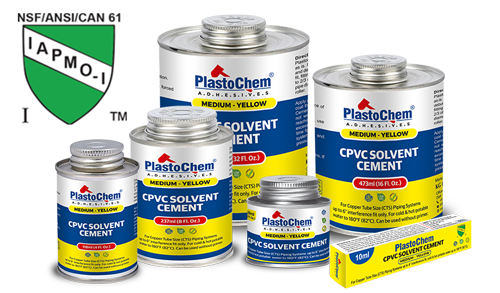Choosing the Best Solvent Cement for Leak-Free Joints
Things to Remember When Choosing Solvent Cements
Building a dependable plumbing system goes beyond just picking top-quality pipes and fittings. The true strength of your system lies in how well these components are joined. Using the right solvent cement is critical—if your cement isn’t compatible with your pipe material, you risk weak, leaky joints that can lead to expensive problems later.
With a wide variety of solvent cements on the market, each designed with unique properties and advantages, how do you make the right choice? Whether you’re a plumbing professional or tackling a home repair, here’s what you need to know to select the best solvent cement for leak-free, long-lasting joints.
Choosing the Best Solvent Cement for Leak-Free Joints
1. Pipe Compatibility
Your first priority should be matching the solvent cement to your pipe type. Solvent cements are specially formulated for different materials—mainly PVC and CPVC.
-
PVC Solvent Cement: Often called “pipe glue,” PVC cement is designed to chemically soften and fuse PVC pipes and fittings together. This creates a powerful molecular bond in minutes, resulting in a joint that’s as strong as the pipe itself.
-
CPVC Solvent Cement: Made with CPVC resin, stabilisers, and fillers in a chemical solvent, this cement is tailored for CPVC systems. It creates a durable, chemical-resistant bond perfect for hot water and industrial applications.
2. Chemical Efficiency & Process Considerations
The effectiveness of a solvent cement isn’t just about how quickly it sets. Consider:
-
Isolation & Clean-up: How easily can the solvent be removed or isolated after application? This is essential for avoiding contamination in sensitive systems.
-
Work-up & Removal: Can residual solvents be efficiently eliminated through processes like distillation? This affects overall project cost and complexity.
3. Industrial Performance Factors
Large-scale and industrial projects come with specific requirements:
-
Boiling & Freezing Points: Important for processing, storage, and transportation—especially in extreme temperatures.
-
Density: Affects flow, application, and handling on site.
-
Recoverability/Recyclability: Being able to reuse solvents lowers costs and reduces environmental impact.
4. Safety & Health
Exposure to certain solvents can pose health risks. It’s vital to evaluate toxicity—both short-term and long-term—to protect workers and ensure a safer work environment.
5. Quality Matters
For high-stakes applications like pharmaceutical or food-grade systems, solvent purity is non-negotiable. Even minor impurities can compromise the end product, so always insist on top-grade, certified solvent cements.
6. Total Cost of Ownership
While price is a key factor, look beyond the sticker cost. Include expenses for storage, handling, and proper disposal to get a true picture of long-term value.
7. Regulatory Compliance
With evolving standards such as REACH impacting the use of certain chemicals, it’s crucial to choose solvent cements that meet all local and international regulations, ensuring your project remains compliant and future-proof.
Why Choose Plastochem’s Weld-On Solvent Cements?
When it comes to securing leak-proof, dependable joints, professionals trust Plastochem’s Weld-On range. This specialized line features premium PVC and CPVC solvent cements and primers, engineered to deliver unmatched bonding strength across a variety of applications.
✅ Certified Quality: NSF and ISI certified for safety and performance.
✅ Low-VOC Formulas: Environmentally friendly, industrial-grade solutions.
✅ Tailored Options: Available in heavy, medium, and regular body variants to match every project need.
✅ Universal Compatibility: Works across all pipe classes and schedules, making it a truly versatile choice.




Comments
Post a Comment